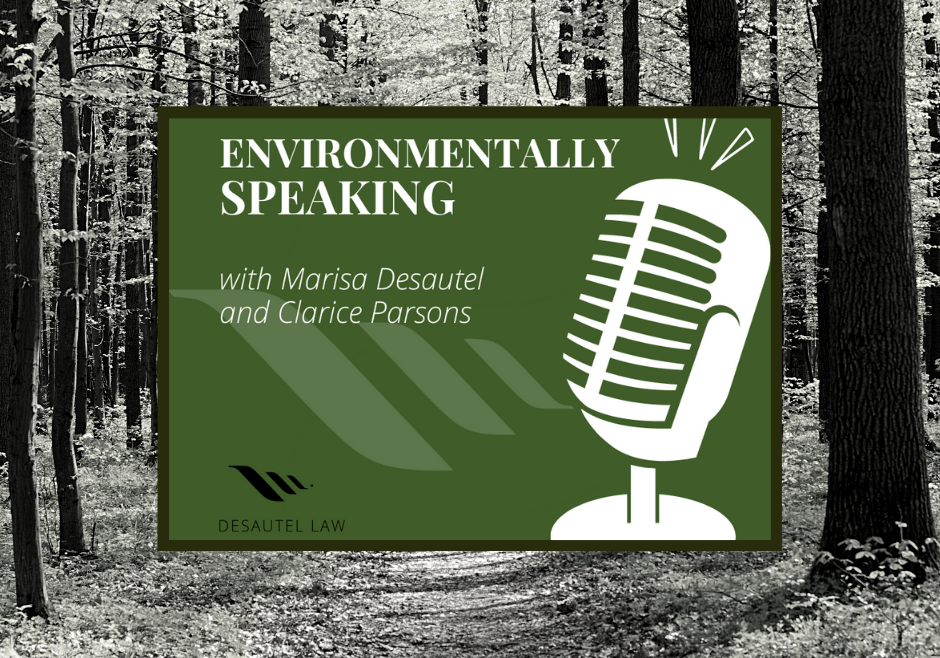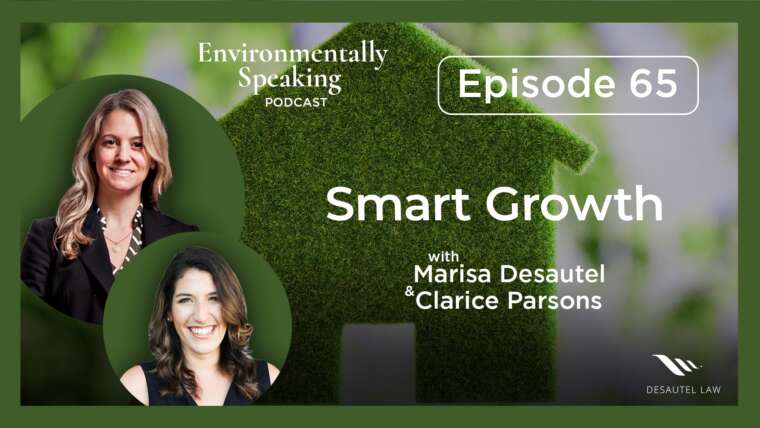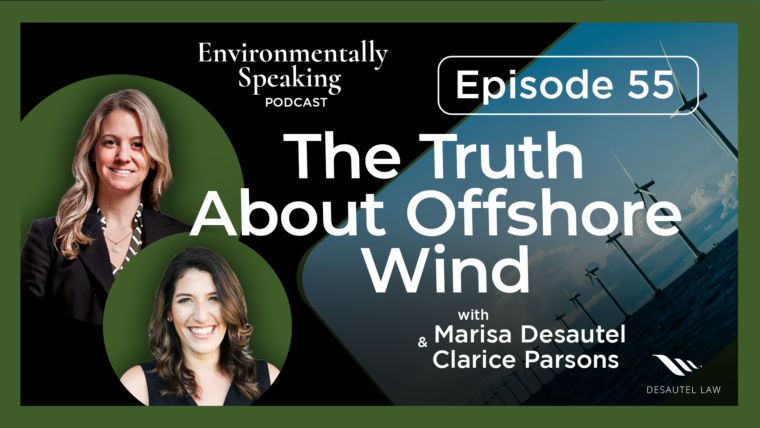Conservation Restrictions vs. Conservation Easement
On this episode, we had a request from one of our listeners to discuss conservation restrictions. So, we must first understand what are the basics for conservation easement versus conservation restriction. First, it is a very legally nuanced. It’s important to understand because when you are looking to develop land or if you’re working for government if you’re looking to try to conserve land there are two completely different mechanisms that serve two different legal purposes. We are going to go over the difference between the two and what you should look for.
Take a listen and let us know what you think, or if you have any suggestions for what we should talk about in the future podcasts!
Episode 43 -Transcript
CLARICE: Good morning, everybody. Welcome to this week’s episode of Environmentally Speaking. We are coming to you from a Wednesday. Hey, I’m excited. It’s Wednesday.
MARISA: I mean, can I get a word in edgewise here?
CLARICE: Yeah. Yeah. Yeah.
MARISA: Okay. So I’m Marisa Desautel an environmental attorney in Rhode Island and my cohost here is Clarice.
CLARICE: Good morning. All right. So today we have a listener request from our favorite reoccurring character Superfund Zack.
MARISA: I’m enjoying the listener requests because I feel like someone’s listening and maybe I’m making a little bit of sense if there’s a topic that someone wants to hear more information about, so I feel pretty good today.
CLARICE: I’m always excited when they ask us to figure out stuff. It’s less brainstorming for us.
MARISA: True. So what is the listener request?
CLARICE: It is conservation restrictions. Apparently, according to Zack it has become a hot topic.
MARISA: In Massachusetts?
CLARICE: I guess so.
MARISA: Any background on that?
CLARICE: No. He just said it was very exciting. Yeah. That was the full conversation.
MARISA: Exciting. Okay. Okay. Well, okay. I don’t know that I would say it’s exciting, but I guess also it’s a good topic to talk about this week because our two previous podcasts were lengthy and conservation easements/conservation restrictions are pretty narrow topics, so I thought this particular episode might be a bit shorter for those folks that don’t have the patience to sit through a half hour. This is a good 15-minute topic.
CLARICE: I like it.
MARISA: So in Rhode Island what are the basics for conservation easement versus conservation restriction? And I know that Superfund Zack did not ask for a description of or a comparison of those two categories, but I feel it is incumbent upon me to provide that information because it’s probably the most mischaracterized, misused type of land use. And not surprisingly it’s because the conservation easement versus a conservation restriction is a very legally nuanced issue. And it’s important because when you are looking to develop land or if you’re working for government if you’re looking to try to conserve land there are two completely different mechanisms that serve two different legal purposes. What is a conservation easement, Clarice? Do you have any idea?
[0:03:11] CLARICE: Oh, goodness. All right. Law school was 1,000 years ago. A conservation easement, well, an easement in general is permission to use a property that’s not yours.
MARISA: Oh, nicely done. Yeah. It’s an ownership right, but it’s less than actually being what’s called a fee title owner. So when you buy property, as you have, you know that you convey property through the use of a deed. And there’s many different types of deeds, but for purposes of today’s conversation you become a fee title owner once your name is on a deed and is recorded in something called the land evidence records. If you’ve ever been to town or city hall, you’ll see – in Rhode Island, anyway, you’ll see a particular office or room sometimes called a vault that contains all of the deeds recorded for every piece of property within that municipality. Prior to the internet everything was physically and manually recorded –
CLARICE: In books.
MARISA: — in books. Prior to typewriters and computers, these deeds were handwritten and they date back, you know, 1700s, whenever the municipality was incorporated. So an easement is less than the situation that I just explained because the easement is conveyed not by deed because you’re not buying the property. You’re not becoming an owner of the property. Instead what you’re getting is an ownership right that’s held by someone other than the property owner, but it doesn’t mean that you actually own that easement. You just have the right to use it.
CLARICE: Yeah. So you own a certain bit of access or a certain activity on the property.
MARISA: Right.
CLARICE: But you’re not paying the property taxes.
MARISA: Yes. That is true. So you’ve got this right to possess the property. You’ve got the right to control the use of the property. You can exclude others from using it and you have the right of something called quiet enjoyment which means that no one should interfere with your use of the easement. So that’s easement explained. A conservation easement is a specific type that means the possession, control, quiet enjoyment use of the property can only be for conservation purposes. It can’t be for –
[0:06:14] CLARICE: A house.
MARISA: — a house or, I don’t know, a dirt bike track.
CLARICE: Okay. So is that now – hearing that it can’t be – it can only be for conservation, does that mean that there can be no building on that property?
MARISA: Favorite answer.
CLARICE: It depends.
MARISA: It depends. So what is conservation? I think that’s the question. Conservation is a look towards a piece of property and trying to maintain its current condition, its current functions and values, the current natural state of the resource. So depending on what the property is currently used for and what the parties want to conserve will dictate how that easement can be used. The example I’m thinking of right now is you’ve got your state parks and recreation program that’s governed by the Department of Environmental Management. Some of those uses include public bathrooms, parking lots, so in that context you might have a conservation easement that includes the use of erecting a building for bathrooms or paving for parking lots.
CLARICE: Okay. I was thinking – that’s interesting that you say the different uses. So, you know, one, there’s that accommodation of we want this conservation space to be enjoyed by people, so we need to make these things like the parking lots and the bathrooms. And then I was also thinking of the additional use of educational. Like sometimes in parks you see those little buildings almost like a micro museum where they say, you know, on the trails you’ll see these plants and these birds and look out for this stuff. So that makes sense. You can have building depending on – in a conversation how do you – how does a property become a conservation property?
MARISA: The parties have to want it.
CLARICE: Can it be any property?
MARISA: It’s not something that you can force on a property owner. The property owner and the third party that’s accepting the easement have to agree that that’s something that they want together.
CLARICE: Does it have to be a special type of property, or like –
MARISA: No.
CLARICE: — does it have to be something – it doesn’t? It could be any lot?
[0:09:01] MARISA: You can conserve whatever you want. The state statute in Rhode Island contemplates a unique feature or a natural feature, so, no. As long as you are looking to conserve something, that’s really the only criteria. It doesn’t have to be a wetland. It doesn’t have to be a completely forested property so long as the unique and natural scenic value is being conserved.
So we see conservation easements in Rhode Island throughout the state. Some of them are between the property owner and the municipality and some are between the property owner and the state or a state agency, so it kind of depends on the parties that are involved. And that’s a rabbit hole of information that I’m not going to go down unless we have a further request, but that gets very specific and I don’t know that our listenership would be all that interested. And I did want to get into what the difference is between a conservation easement and a conservation restriction, so I’ll put it back to you since I’ve been talking this entire time. Any idea what a conservation restriction is?
CLARICE: I’m imagining it’s some use that a normal property owner would have a conservation property owner doesn’t get because of the nature of the property. So because this specific property is there for preservation, you don’t get the normal rights of, I don’t know, somebody who just bought a plot for a house.
MARISA: Okay.
CLARICE: Do I get half credit?
MARISA: Yeah. I feel like you’re –
CLARICE: I’m keeping it vague because I don’t really know.
MARISA: You are. Okay. Well, I appreciate that.
CLARICE: We are now at the cocktail party part of the conversation where I just agree and used the two pieces of info I know to get me through.
MARISA: Okay. So, no, that was good. I appreciate that. The conservation restriction – and I’m looking down right now because there is an excellent document that an attorney in Rhode Island put together [inaudible]. He’s a wonderful attorney and he worked on this particular manual to try to explain the difference between easements and restrictions for town planners, state officials, and land use attorneys in Rhode Island and I want to make sure that I properly cite information that’s included in this manual. I highly recommend looking through it if you’re in the industry. It’s pretty comprehensive. And the DEM put its stamp of approval on it, so you know it’s done well.
So a conservation restriction is different from a conservation easement because the easement, as we discussed, necessarily implicates that a third party has the right to possess and use a certain piece of property. The conservation restriction is just like what it sounds. It’s actually restricting the use of a particular piece of property so that – again, it’s got conservation in mind. It’s meant to protect the property from generally development. When you record a conservation restriction, you’re saying that you’re not going to develop or otherwise change the property, but it doesn’t mean that there’s a third party that can come in and use the property for their benefit. So there’s a major distinction there. Did I explain that well or not?
[0:13:08] CLARICE: Yes. So it sounds like a restriction is no use – you can’t do this one particular type of use.
MARISA: Yeah.
CLARICE: An easement is you might not be able to do this specific type of use because somebody else is. No? I’m thinking of a walking path. You can’t bulldoze and destroy the walking path in an easement because that’s somebody else’s, but in a restriction there’s no path. There’s no third party coming in.
MARISA: Yes. That’s right.
CLARICE: Nailed it.
MARISA: And it’s an important difference because you see conservation restrictions where a property is being developed, either subdivided or proposed for development. And generally it’s the municipality that is looking for a developer to put land in this restriction so that the town’s comprehensive plan is adhered to in terms of maintaining open space. The interesting part about a conservation restriction is that historically restricting the use of real property in the United States is not favored because we’ve got this U.S. Constitution that allows for life, liberty, pursuit of happiness and the ability to use your property as you want.
So in Rhode Island conservation restrictions are only good for 30 years and that’s set by statute. So you can record a conservation restriction, but it expires after 30 years unless the state is a party to the restriction and then it can continue on in perpetuity. So that’s a statutory element that our legislature thought to enact and not everybody knows about it. If you think about a restriction being recorded, it exists forever, right. I mean –
CLARICE: That’s what I thought.
MARISA: — who would know that there’s a statute out there that limits it to 30 years, but that’s the truth.
CLARICE: Can you renew it? At the end of your 30 years, could somebody else renew it?
MARISA: You could not renew. You could record a new conservation restriction.
CLARICE: Okay.
MARISA: That would also expire at 30 years. But, no, there’s no renewal clause in the statute.
CLARICE: All right. Turns out conservation restrictions are juicier than I thought. There’s some weird stuff happening.
[0:16:01] MARISA: A lot of drama.
CLARICE: Apparently. Hence why it’s a hot topic. I should have never doubted Zack.
MARISA: That’s all I got on that.
CLARICE: That was interesting. I’m not going to lie. I learned a lot as our listeners saw, clearly didn’t know most of it, so I was learning with you. Oh, do you want to tell everybody who next week’s guest is? I’m very excited.
MARISA: No. But I bet you do.
CLARICE: I do. We’re talking to Leo Pollock. He is a food waste expert and I am so excited for this because – I don’t know if I’ve shared this – I love to cook. I love to eat. I love all things food, so if there’s something I can do to be better with my scraps other than making stock over and over again I want to hear it. I want to hear what happens to all the food we don’t use.
MARISA: Yeah. Leo is the co-owner of The Compost Plant and they are engaged in the practice of composting food waste. This was actually a topic that some listeners requested six months ago and we’ve been trying to get Leo to come on and talk to us about the topic and he’s just been really busy. There’s been some changes in state law and regulation that he’s trying to follow, so he was kind enough to set aside some time for us and I’m looking forward to hearing what he’s got to say.
CLARICE: Yes. I am thrilled. So on that note, if you guys have any questions, comments, topics that you want us to talk about please let us know. Reach out at Help@DesautelESQ.com. Hit us up on the socials, Desautel Law. And have a great rest of your week.
___________________________________________
Follow us on Instagram
🎙Subscribe to ‘Environmentally Speaking’ on Apple Podcasts: https://apple.co/31WNpI8
👩💼 Learn about our services.
Check out our previous episodes.




